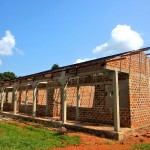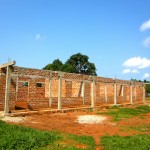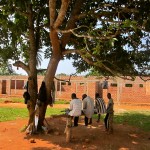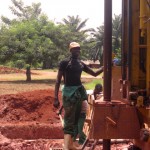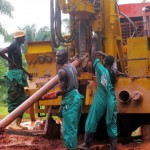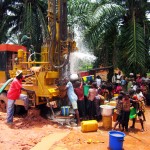Another sunny day in Congo, and the World Vision office is buzzing as usual. The latest exciting projects address two of the biggest needs in Gemena: Water and Education.
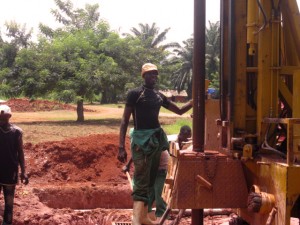
Workers at the drill site.
The Ledia Water Project is well under way and drilling has begun in the Saza Neighborhood. This neighborhood was identified as one of Gemena’s poorest, and it is also home to the greatest number of registered children. One well has been completely dug already, and the final goal is to build three wells that will serve 6,000 people each. This water will be clean with much easier access than this community has previously seen. After solar pumps are installed, quality of life will change dramatically for the people of this neighborhood. Water well management committees, made entirely of women, have been formed to ensure that water points are well maintained and everyone in the community benefits.
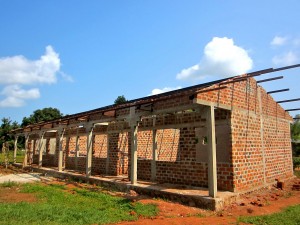
School construction site at Bokonzo.
Addressing the community education needs, construction of three new schools is nearly finished, one with each major church partner: the Covenant Church of Congo (CEUM), the Free Church of Congo (CECU), and the Catholic Church of Congo (Molegbe Diocese). These schools will serve 300 students each. Classroom sizes will be smaller than the average Gemena area schools, and World Vision has and will continue to train teachers to improve quality of education and pedagogy. World Vision aims to create school environments where both children and teachers alike want to continue coming to school. Educating girls is a major challenge because so many drop out early to help with daily tasks at home and in the garden. World Vision with its partners are sensitizing the community on the importance of girls being educated and staying in school. The hope is to commence classes as early as next month, October 2013.
These are big initiatives that require much more than building and drilling expertise. Without sustained partnership and capacity building of water management committees and school staff, these projects would not succeed. World Vision has spent much of it’s first year in operation building partnerships and capacity in order to arrive where they are now: implementing large-scale projects that will thrive under local community leadership.
- School construction site at Bokonzo.
- Another view of construction site.
- Workers taking a break at construction site.
- Worker at the water site.
- Workers drilling at water site.
- Water flowing from water site.
